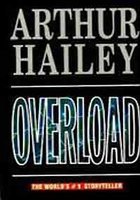I bought this book when I was twelvish/ thirteen..around that time but only got around to reading it at nineteen. And I’m really glad I did, I don’t think I would’ve fully absorbed the depth of it had I read it back when I bought it.
‘Overload’ is a fictional novel about the power industry and how electricity generation companies in the United States function. The book follows Nim Goldman, vice president of GSP&L (the main power provider for the state of California), in the midst of all the drama that comes with being in charge through a very rough power famine. The plot explores the dilemma of utility companies and the difficulties they face as they fight to satisfy the ever increasing demands for electricity. It goes to show the amount of challenges that face a corporation fighting to stay afloat through terrorism, power theft, extremely bureaucratic procedures imposed by politicians to win over the public, all while keeping the peace with environmentalists protesting their every move.
Though it is the only book I ever read for Arthur Hailey, it was enough for me to deem him a truly great writer. He managed to offer a very professional and deep insight into the power industry without taking away from the fun in his novel. What made this particular novel, and subsequently the writer, so great in my opinion is the thoroughly researched quality of the information around which he built his novel. This is a writer who made sure to do his homework before delving into the fictional world he’s creating. And nothing makes me happier than gaining some factual knowledge from a work of fiction I’m reading, it’s like an added bonus I always welcome with open arms.
One aspect of the book that was particularly interesting to me was the conflict between the environmentalist movements and those in charge of the power industry. Being someone who is interested in environmental preservation and renewable energy, this gave me a more in depth view on the -behind the scenes- politics involved in the field and the magnitude of the effort it would take for such monumental changes in our power consumption to take effect. It also shed light on the everlasting debate of environmental conservation versus industrial development. Is the price we pay for development really worth it? It’s a little sad how this book was published in 1986, yet most of the issues it tackles are still relevant today. Goes to show how little attention the problem has been handed.
The book truly was an ‘overload’ of highly interesting topics from environmental issues and the handling of electric power to the diminishing fuel resources and terrorism to infidelity and its effect on family life to the safety procedures taken to consider the special needs portion of the population. It’s a highly packed and interesting read with intermingling varied topics.
“Okay, there are some who say we ought to have lower standards of living, all of us, that we live too well and should be deprived. Well, maybe that’s true, maybe not. But either way, that kind of decision for change isn’t for power companies like GSP & L to make. Our responsibility is to maintain the living standards which people-through their elected governments-tell us that they want.”
― Arthur Hailey, Overload

